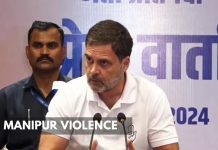New Delhi, Sep 6: A five-judge constitution bench of the Supreme Court on Thursday unanimously decriminalised part of the 158-year-old colonial law under Section 377 of the IPC which criminalises consensual unnatural sex, saying it violated the rights to equality.
The constitution bench headed by Chief Justice Dipak Misra termed the part of Section 377 of the Indian Penal Code which criminalises consensual unnatural sex as irrational, indefensible and manifestly arbitrary.
The bench, which also comprised Justices R F Nariman, A M Khanwilkar, D Y Chandrachud and Indu Malhotra, struck down part of (rpt part of) Section 377 of the IPC as being violative of the right to equality and the right to live with dignity.
In four separate but concurring judgements, the top court set aside its 2013 verdict in the Suresh Kaushal case which had re-criminalised consensual unnatural sex.
The bench said the other aspects of Section 377 of the IPC dealing with unnatural sex with animals and children remain in force.
“Any kind of sexual activity with animals shall remain a penal offence under Section 377 of the IPC,” the bench said.
Dealing with a clutch of petitions, the court held that section 377 of IPC was used as a weapon to harass members of the Lesbian, Gay, Bisexual, Transgender and Queer (LGBTQ) community, resulting in discrimination, with Justice Indu Malhotra in her separate judgement saying that history owes an apology to the community for denying them their rights and compelling them to live a life of fear.
Section 377 refers to ‘unnatural offences’ and says whoever voluntarily has carnal intercourse against the order of nature with any man, woman or animal shall be punished with imprisonment for life, or with imprisonment of either description for a term which may extend to 10 years, and shall also be liable to pay a fine.
The historic judgement came on a batch of writ petitions filed by dancer Navtej Jauhar, journalist Sunil Mehra, chef Ritu Dalmia, hoteliers Aman Nath and Keshav Suri and business executive Ayesha Kapur and 20 former and current students of the IITs.
They had sought decriminalisation of consensual sex between two consenting adults of the same sex by declaring Section 377 illegal and unconstitutional.
The top court said the LGBTQ community possesses same human and fundamental rights as other citizens.
CJI Misra, who wrote the judgement for himself and Justice Khanwilkar, said the denial of self expression was akin to inviting death. The other three judges have written their separate concurring verdicts.
The bench said courts must protect the dignity of an individual as right to live with dignity is recognised as fundamental right. It termed sexual orientation as a “biological phenomenon” and held that any discrimination on this ground was violative of fundamental rights.
In so far as consensual unnatural sexual act in private is concerned, it is neither harmful nor contagious to society, the bench said.
Justice Nariman asked the government and the media to give wide publicity to the verdict so that the LGBTQ community does not face any further discrimination.
Justice Chandrachud, while reading out the operative portion of his verdict, said the members of LGBTQ community were targeted and exploited due to Section 377 of IPC. The members of this community have constitutional rights like that of any other citizen, he said.
Observing that the Constitution nurtured dissent as a “safety valve” of the society, he said “we cannot change the history but can pave a way for better future.”
Justice Chandrachud also said that due to Section 377, the LGBTQ members were forced to live in hiding and as second class citizens, while the others used to enjoy the right of sexual orientation.
He said the denial of right to sexual orientation was akin to denial of right to privacy and the society cannot dictate sexual relationship between consenting adults as it was a private affair.
The apex court also said India was a signatory of international treaties on rights of LGBTQ and it was obligatory to adhere to them.
The bench also said that homosexuality was not a mental disorder but a completely natural condition.
The issue was first raised by the NGO, Naaz Foundation, which approached the Delhi High Court in 2001. The Delhi High Curt had in 2009 decriminalised sex between consenting adults of the same gender by holding the penal provision as “illegal”.
This high court judgement was overturned in 2013 by the apex court which also dismissed the review plea against which the curative petitions were filed which are pending.
The writ petitions were opposed by Apostolic Alliance of Churches and Utkal Christian Association and some other NGOs and individuals, including Suresh Kumar Kaushal. (Agencies)






